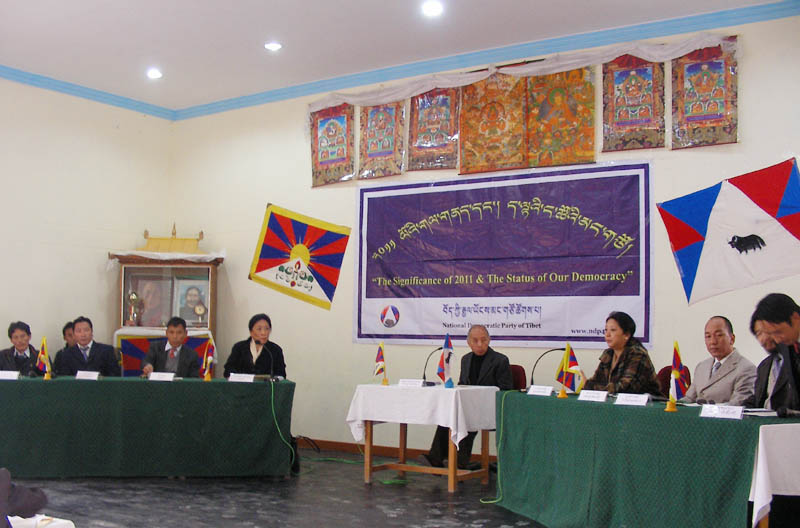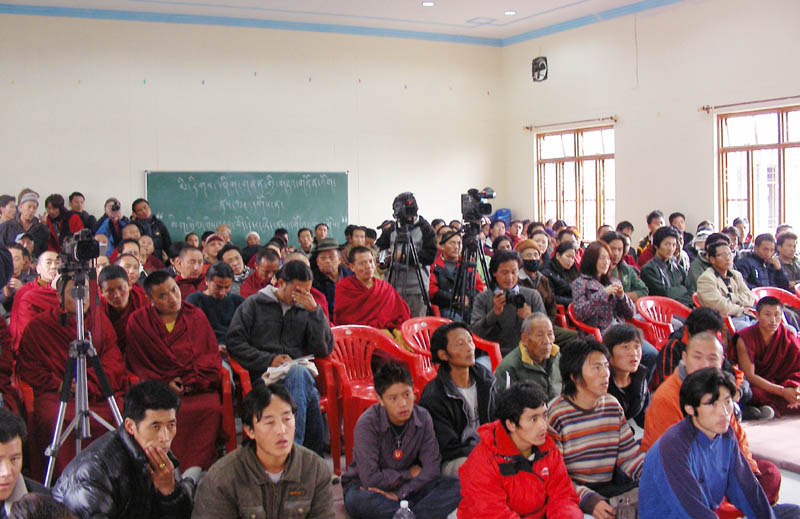 Dharamshala: Yesterday, the National Democratic Party of Tibet (NDPT) organized a panel discussion at the Tibetan Children’s Village (TCV) Day School in McLeod Ganj on the significance of the 2011 elections for new leader and the status of Tibetan democracy. The panel of eight included Jamphel Choesang, Election Commissioner for the Central Tibetan Administration (CTA), Rinchen Khandro, former CTA Minister, Gyari Dolma, Deputy Speaker of TPIE, Dawa Phunkyi, CTA Member of Parliament, Choenyi Woeser, assistant-Editor of Tibet Express, Tsewang Rigzin, President of the Tibetan Youth Congress, Lungrig Gyal, Editor of Tibet Times, and Lukhar Jam, an independent researcher. Mediated by Tashi Wangchuk , senior reporter of Voice of Tibet and Utruk Tsering from NDPT, the panelists spoke to a crowd of approximately 400, many from the younger generation of Tibetans-in-exile.
Dharamshala: Yesterday, the National Democratic Party of Tibet (NDPT) organized a panel discussion at the Tibetan Children’s Village (TCV) Day School in McLeod Ganj on the significance of the 2011 elections for new leader and the status of Tibetan democracy. The panel of eight included Jamphel Choesang, Election Commissioner for the Central Tibetan Administration (CTA), Rinchen Khandro, former CTA Minister, Gyari Dolma, Deputy Speaker of TPIE, Dawa Phunkyi, CTA Member of Parliament, Choenyi Woeser, assistant-Editor of Tibet Express, Tsewang Rigzin, President of the Tibetan Youth Congress, Lungrig Gyal, Editor of Tibet Times, and Lukhar Jam, an independent researcher. Mediated by Tashi Wangchuk , senior reporter of Voice of Tibet and Utruk Tsering from NDPT, the panelists spoke to a crowd of approximately 400, many from the younger generation of Tibetans-in-exile.
In light of His Holiness the Dalai Lama’s increasing age, many feel the 2011 elections will prove to be a critical juncture for Tibetan leadership. In recent years, the Chinese government has grown increasingly disinterested in reaching a mutual agreement regarding Tibetan autonomy, going so far as to break off talks with His Holiness’ envoy. Likewise, the younger generation of Tibetans-in-exile has become frustrated with the “Middle Way” approach to politics. More and more Tibetan youths feel that decisive action and extreme measures may be the only way to get results. In a truly democratic forum, the featured panelists weighed in on the issues, openly debating points with one-another.
Before the discussion began, Chime Youngdung, President of the NDPT offered opening remarks. “These days, the main activity of our organization is spreading awareness of the candidates for the next prime ministerial and parliamentary elections.”
Commissioner Choesang then explained the new voting requirements for 2011. In addition to being at least 18 years of age, voters will require an Indian-issued refuge card and a green book issued by the Tibetan government-in-exile. Deputy Speaker Dolma interjected that nowhere in the Tibetan constitution is there mention of voters needing these documents. Mr. Choesang conceded her point, but informed the audience that Indian police officials have declared that any Tibetans in India who do not have these documents will be regarded as tourists without passports, and subject to similar punishment. He made it clear that this should be considered a warning to Tibetans.
 Utruk Tsering then read a statement prepared by Kriti Rinpoche, a former Minister of Parliament who, due to ailing health could not attend. In it, Kriti Rinpoche said, “Though the elections are two years away, candidates who are currently preparing to run truly care about Tibetan issues, and understand the benefits of democracy for Tibetans. Those candidates who are not yet preparing may be either lazy or uncaring.”
Utruk Tsering then read a statement prepared by Kriti Rinpoche, a former Minister of Parliament who, due to ailing health could not attend. In it, Kriti Rinpoche said, “Though the elections are two years away, candidates who are currently preparing to run truly care about Tibetan issues, and understand the benefits of democracy for Tibetans. Those candidates who are not yet preparing may be either lazy or uncaring.”
Deputy Speaker Dolma went on to discuss how the Tibetan democratic government is different than other democracies. While other governments are run by political parties, she praised the fact that “our government is run by the people.” Tsewang Rigzin, President of the Tibetan Youth Congress, the largest and oldest Tibetan NGO-in-exile, often labeled as militant by the Chinese government, countered by saying that a two-party system would foster healthier debate amongst law-makers, ultimately strengthening the government-in-exile.
MP Dawa Phunkyi asserted that the primary elections at the end of 2010 are as, if not more significant than the main elections of 2011. “If good candidates do not make it past the primaries, it will not matter who wins the main elections.”
Ludhar Jam, an advocate for Tibetan independence, cited China’s lack of response to the CTA’s Memorandum for Genuine Autonomy, issued last year. Jam asserted that, unlike current Prime Minister Sangdong Rinpoche, who is a proponent of Middle Way diplomacy, “The next prime minister should be a fighter for independence.”
In an attempt to bring Tibetans to the polls, Choenyi Woeser condemned voting apathy of previous elections, claiming that it is the responsibility of the election commission to encourage and make voting more accessible.
In the spirit of healthy debate, and despite their ideological disagreements about the future of Tibetan politics, all panelists agreed that the direction of the Tibetan government-in-exile will be largely decided in 2011.


![Tibet has a rich history as a sovereign nation until the 1950s when it was invaded by China. [Photo: File]](/images/stories/Pics-2024/March/Tibet-Nation-1940s.jpg#joomlaImage://local-images/stories/Pics-2024/March/Tibet-Nation-1940s.jpg?width=1489&height=878)















